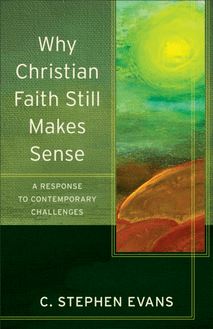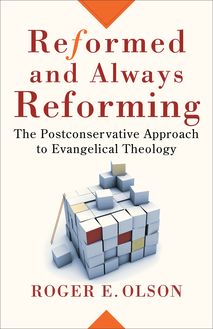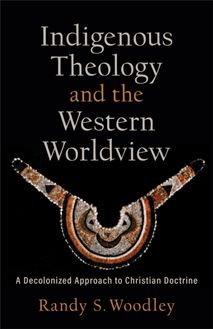Why Christian Faith Still Makes Sense (Acadia Studies in Bible and Theology) , livre ebook
82
pages
English
Ebooks
2015
Vous pourrez modifier la taille du texte de cet ouvrage
Obtenez un accès à la bibliothèque pour le consulter en ligne En savoir plus
Découvre YouScribe et accède à tout notre catalogue !
Découvre YouScribe et accède à tout notre catalogue !
82
pages
English
Ebooks
2015
Vous pourrez modifier la taille du texte de cet ouvrage
Obtenez un accès à la bibliothèque pour le consulter en ligne En savoir plus
Publié par
Date de parution
12 mai 2015
Nombre de lectures
3
EAN13
9781493400225
Langue
English
Poids de l'ouvrage
1 Mo
Publié par
Date de parution
12 mai 2015
EAN13
9781493400225
Langue
English
Poids de l'ouvrage
1 Mo
Acadia Studies in Bible and Theology
Craig A. Evans and Lee Martin McDonald, General Editors
T he last two decades have witnessed dramatic developments in biblical and theological study. Full-time academics can scarcely keep up with fresh discoveries, recently published primary texts, ongoing archaeological work, new exegetical proposals, experiments in methods and hermeneutics, and innovative theological syntheses. For students and nonspecialists, these developments are confusing and daunting. What has been needed is a series of succinct studies that assess these issues and present their findings in a way that students, pastors, laity, and nonspecialists will find accessible and rewarding. Acadia Studies in Bible and Theology, sponsored by Acadia Divinity College in Wolfville, Nova Scotia, and in conjunction with the college’s Hayward Lectureship, constitutes such a series.
The Hayward Lectureship has brought to Acadia many distinguished scholars of Bible and theology, such as Sir Robin Barbour, John Bright, Leander Keck, Helmut Koester, Richard Longenecker, Martin Marty, Jaroslav Pelikan, Ian Rennie, James Sanders, and Eduard Schweizer. The Acadia Studies in Bible and Theology series reflects this rich heritage.
These studies are designed to guide readers through the ever more complicated maze of critical, interpretative, and theological discussion taking place today. But these studies are not introductory in nature; nor are they mere surveys. Authored by leading authorities in the field, the Acadia Studies in Bible and Theology series offers critical assessments of the major issues that the church faces in the twenty-first century. Readers will gain the requisite orientation and fresh understanding of the important issues that will enable them to take part meaningfully in discussion and debate.
© 2015 by C. Stephen Evans
Published by Baker Academic
a division of Baker Publishing Group
P.O. Box 6287, Grand Rapids, MI 49516-6287
www . bakeracademic . com
Ebook edition created 2015
All rights reserved. No part of this publication may be reproduced, stored in a retrieval system, or transmitted in any form or by any means—for example, electronic, photocopy, recording—without the prior written permission of the publisher. The only exception is brief quotations in printed reviews.
Library of Congress Cataloging-in-Publication Data is on file at the Library of Congress, Washington, DC.
ISBN 978-1-4934-0022-5
Scripture quotations are from the Holy Bible, New International Version®. NIV®. Copyright © 1973, 1978, 1984, 2011 by Biblica, Inc.™ Used by permission of Zondervan. All rights reserved worldwide. www.zondervan.com
Contents
Cover i
Title Page iii
Copyright Page iv
Preface vii
1. Who Are the New Atheists, and What Are They Saying? 1
2. The Value of Natural Theology 13
3. The Concept of a Natural Sign for God 29
4. Natural Signs for God and Theistic Arguments 39
5. Can We Trust the Natural Signs for God? 59
6. Recognizing God’s Self-Revelation 75
7. Criteria for a Genuine Revelation from God 93
8. Conclusions: Making the Case for Christian Faith 117
Bibliography 137
Index 143
Back Cover 146
Preface
This book grew out of an invitation I received to give the Hayward Lectures at Acadia Divinity College at Acadia University in Wolfville, Nova Scotia, October 15–17, 2012. The general title of the lectures was “Christian Belief in the 21st Century: Responding to the New Atheism.” Of course, the three lectures have been expanded to make a proper book, but some of the character of the book no doubt reflects its origins as a lecture series. In some ways, the subtitle of the lecture series is misleading. As readers of the book will quickly note, I do not engage very seriously with the leading “New Atheist” writers. This is primarily because I do not find the arguments and ideas of these writers worthy of serious refutation. In comparison with contemporary atheist philosophers of religion such as William Rowe, Paul Draper, and Evan Fales, whose writings constitute thoughtful and serious challenges to faith, the New Atheists show a lack of philosophical understanding and sophistication. (The exception to that claim is Daniel Dennett, who is a first-rate philosopher but who still reveals a lack of expertise in the philosophy of religion.)
Nevertheless, I think the subtitle is still accurate. I take it that the major complaint (though not the only one) of the New Atheists about religion is that faith is intellectually baseless. In this book I try to give a clear case that belief in Christian faith still makes sense and thus answer that criticism. Although Christian faith requires the ability to stare down some of the intellectual fads and fashions of our age, it does not require the sacrifice of the mind. So the book answers a major charge the New Atheists make not by responding to their specific complaints but by showing how a thoughtful Christian might “give a reason for the hope” that faith embodies. In making a positive case the book transcends the criticisms of the New Atheists and thus can be read with interest by anyone wanting to explore the truth of faith questions. The other major complaint of the New Atheists is that religion “poisons everything” and is a net harm to society. On that score I am content to refer readers to other writers who are more competent to respond to that criticism than I am.
Some of the ideas in the first part of the book were developed in a more rigorous and lengthy form in my book Natural Signs and Knowledge of God: A New Look at Theistic Arguments . The germ of my approach goes back even further to Why Believe? Reason and Mystery as Pointers to God . However, I believe that in this work I have been able to say some of the things I have said before in new and clearer ways. The second half of the book, particularly the discussion of criteria for revelation, contains some ideas I have not discussed in print before. However, I believe it will be obvious how much I have profited from a lifetime of reading and study of Kierkegaard’s work, so I claim no great originality for my approach. However, given Kierkegaard’s forthright denunciation of apologetics, I dare not claim that this is a book he would have liked, however much it draws on his insights.
I must in conclusion express my deep gratitude to Craig Evans and the Acadia Divinity College faculty for the invitation to give the Hayward Lectures. I am honored to be included among the distinguished scholars who preceded me. The Acadia community welcomed my wife and me with such wonderful hospitality that this time will always be remembered fondly, not least for the chance to experience the beauty of Nova Scotia.
I must also thank Baylor University for a research leave during the spring semester of 2014 and Biola University for a research fellowship awarded by the Center for Christian Thought for the same semester. Although this book was not my primary project during that semester, the release from teaching my normal Baylor classes provided valuable time, and the congenial environment of the Center for Christian Thought at Biola provided the perfect milieu to bring this project to fruition. I must also thank my graduate research assistant, Matthew Wilson, who made a number of helpful suggestions and also tracked down some quotations and references for this book. I also wish to thank Maureen Ryan for compiling the index. Finally, I must thank my wife, Jan Evans, without whom I would accomplish nothing, for her wise advice, unwavering support, and steadfast love.
C. Stephen Evans April 2014
1 Who Are the New Atheists, and What Are They Saying?
From the earliest periods of the Christian church, God has called some to defend the faith against the attacks of unbelievers. In the ancient world early Christians were variously accused of being atheists (because of their rejection of local gods), superstitious (because of their acceptance of miracles, such as the resurrection of Jesus), and subverters of the social order (because of their refusal to worship the emperor and their inclusion of people of all social classes in their communities). Such writers as Justin Martyr, Clement of Alexandria, and Origen responded to all these charges and more. Many apologists have taken 1 Peter 3:15 as providing a kind of charter for the apologetic enterprise: “Always be prepared to give an answer to everyone who asks you to give a reason for the hope that you have.” Peter may not be referring directly to what has come to be known as apologetics, but this verse does seem to imply that Christian hope is not baseless or groundless. A person who possesses Christian faith can approach the world with an attitude of hope regardless of what transpires in this world, and this hope is one that is reasonable, at least from the perspective of faith. Recently, a number of writers, often collectively called “the New Atheists,” have loudly claimed that Christian faith is anything but reasonable. What should the church say in response to such claims? I shall try to answer this question in this book. In this introductory chapter I must first say something about the New Atheists. Who are they? What exactly are their accusations against religious faith in general and Christian faith in particular?
The “Four Horsemen” of the New Atheists
A host of writers could be included under the label of the New Atheism, but I shall limit my discussion to four of the best-known writers: Richard Dawkins, Christopher Hitchens, Sam Harris, and Daniel Dennett, a quartet sometimes described as the “Four Horsemen” of the movement. (Though perhaps one should say that the Four Horsemen are now only a trio, since Christopher Hitchens passed away from pneumonia stemming from cancer in 2011.) Dawkins, an evolutionary biologist now at Oxford, first came to public attention with the publication of The Selfish Gene in 1976, a popular work in evolutionary biology that proposed







